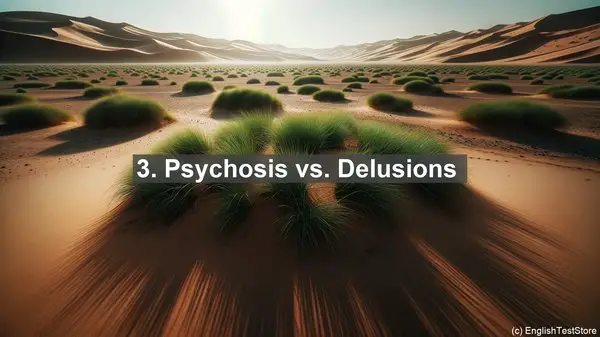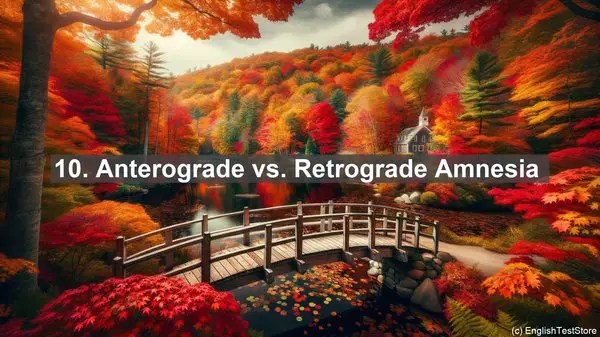Introduction
Welcome to today’s lesson. As students of geriatric psychiatry, it’s crucial to have a strong grasp of the terminology used in this field. In this lesson, we’ll be discussing the top 10 commonly confused words in geriatric psychiatry. Let’s get started!
1. Delirium vs. Dementia
Delirium and dementia are often used interchangeably, but they refer to distinct conditions. Delirium is an acute, reversible state of confusion, usually caused by an underlying medical condition. On the other hand, dementia is a chronic, progressive condition characterized by a decline in cognitive function. Understanding the differences between these two terms is crucial for accurate diagnosis and appropriate management.
2. Depression vs. Dysthymia
Depression and dysthymia are both mood disorders, but they differ in terms of duration and severity. Depression is characterized by a persistent feeling of sadness, loss of interest, and other symptoms that significantly impact daily functioning. Dysthymia, on the other hand, is a milder form of depression, with symptoms lasting for at least two years. Recognizing the nuances between these two conditions is essential for effective treatment planning.
3. Psychosis vs. Delusions
Psychosis is a broad term that refers to a loss of contact with reality. It can manifest as hallucinations, delusions, or disorganized thinking. Delusions, specifically, are fixed, false beliefs that are not based on reality. While all delusions are a form of psychosis, not all instances of psychosis involve delusions. Being able to differentiate between these terms is crucial for accurate assessment and appropriate intervention.
4. Mania vs. Hypomania
Both mania and hypomania are characterized by an elevated mood, increased energy, and other symptoms. However, mania is more severe and can significantly impair functioning, often requiring hospitalization. Hypomania, on the other hand, is a milder form of mania, with symptoms that are less severe and do not usually result in significant impairment. Recognizing the differences between these two states is important for appropriate treatment planning.
5. Agitation vs. Anxiety
Agitation and anxiety are often used interchangeably, but they have distinct meanings. Agitation refers to a state of restlessness, often accompanied by irritability and increased motor activity. Anxiety, on the other hand, is characterized by excessive worry, fear, and a range of physical symptoms. Understanding the differences between these two terms is important for accurate assessment and targeted intervention.

6. Euphoria vs. Elation
Euphoria and elation both describe an intense feeling of happiness or joy. However, euphoria is more intense and can be described as an exaggerated or abnormal sense of well-being. Elation, on the other hand, is a more moderate form of happiness. Recognizing the differences between these two terms is important for understanding the emotional states of patients and their potential underlying causes.
7. Withdrawal vs. Isolation
Withdrawal and isolation are often used interchangeably, but they have distinct meanings. Withdrawal refers to a retreat or disengagement from social interactions or activities. Isolation, on the other hand, is a state of being alone or separated from others. While withdrawal can be a symptom of various conditions, isolation can be a choice or a result of external factors. Understanding the differences between these terms is important for accurate assessment and appropriate support.
8. Antipsychotic vs. Anxiolytic
Antipsychotics and anxiolytics are both classes of medications used in psychiatry, but they have different indications and mechanisms of action. Antipsychotics are primarily used to manage symptoms of psychosis, such as hallucinations and delusions. Anxiolytics, on the other hand, are used to alleviate symptoms of anxiety. Understanding the differences between these medications is crucial for appropriate prescribing and ensuring optimal patient outcomes.
9. Confabulation vs. Malingering
Confabulation and malingering are terms used to describe different types of false information or behavior. Confabulation refers to the unintentional production of false or distorted memories. It is often seen in conditions such as dementia. Malingering, on the other hand, is the deliberate feigning or exaggeration of symptoms for secondary gain. Recognizing the differences between these terms is important for accurate assessment and appropriate management.
10. Anterograde vs. Retrograde Amnesia
Amnesia is a condition characterized by memory loss. Anterograde amnesia refers to the inability to form new memories after the onset of the condition. Retrograde amnesia, on the other hand, is the loss of memories that were formed before the onset of the condition. Understanding the differences between these two types of amnesia is important for accurate diagnosis and appropriate support.

